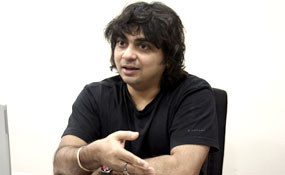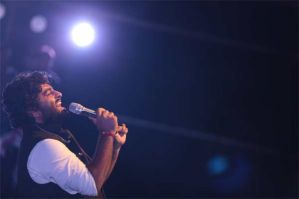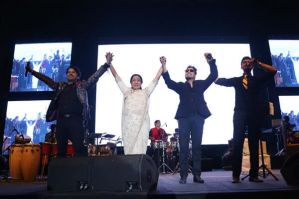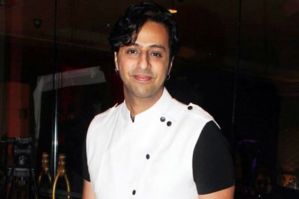Niladri Kumar - 'To appeal to the audience is a big job'

One of the most prominent instruments of Hindustani classical music, the sitar has been given a new sound by sitar virtuoso Niladri Kumar, a sound which is both inviting and explosive and which appeals to the young and old alike.
Niladri Kumar is not only a musician, but also an innovator – his electric version of �sitar' creates waves wherever he plays. This young musician, who has several music awards like the Sur Ratna, Surmani, Jadubhatta Puraskar Sanskriti Award and MTV Immies to his credit, has released his new album 'Priority'.
Radioandmusic.com's Chirag Sutar in a t??te-? -t??te with Niladri Kumar, about his new album, and about his passion Zitar.
Excerpts -
Your music is very unique, and so is the sound. Tell me about �Priority', did you have any specific theme while you where working on it?
Well, I started working on �Priority' in 2003, and I wanted to showcase the sound that �Zitar' gave me. The composing started with the first track �priority' – to gauge the audience response, I played the first piece �priority' at concerts. And, since you always improvise, there were some improvisations which I liked, and thankfully, remembered. So, Priority started that way.
�Priority' happened over five years, and over the years, the sounds changed and new sounds kept inspiring me. So, you will find rock, classical, lounge and also some electronic. At times, it was the theme which inspired me to create a piece of music and sometimes I related a piece of music to a theme. It is not one particular genre.
What's the story behind the name �Priority'?
Endlessly searching, from shore to shore, learning all one can, yet yearning for more, seeking salvation from mediocrity, me, my dreams, my priority.
I travel a lot for concerts and shows. I realized my Sitar and Zitar were totally covered with two labels – Fragile and �Priority'. For me, the instrument has always been a �Priority', that's how the name stuck.
You had an instrumental album �IF' before this, for which you won an MTV Immie. However, in this album you have got Dominique Cerejo and June Banerjee doing vocals. Why?
There are some songs in the album which I have composed, but I have not played, like – �The Final Journey', there were parts where I wanted someone to sing, as listeners relate to words faster, it also helps the melody to get registered. So, this was one reason why I had vocals and lyrics – Santana has done it so many times.
How are you planning to market this album? And why did you choose to launch the album at a college festival?
One of the main reasons we had a launch at a college was because it's a very good platform and you get exposed to a fairly good number of audience. I had played at Mood-I in the past and the response was great. I keep getting offers to play at festivals, this also helps me to connect my music with a section of people who are open to different kind music. Today, there are billions of guitar players all over the world and there are quite a few sitar players as well, this album will appeal to both. Also, we have the �priority' video which will be airing soon.
You have launched the same album under two different labels and names.
Yes, in India the album is launched as �Priority' under the Saregama label, and in the US, it's launched as �Zitar' under Sony Dreyfus.
There are many who are doing fusion music, what is your opinion on it?
Today, bands or musicians take some raga or some bandish and add drums or electronic beats to it, that's not fusion. You need to have knowledge of both western and Indian classical music in order to create soulful fusion music – it takes time.
You infuse a lot of western melodies and tunes, how do youngsters react to this?
When I play in a classical concert, youngsters come to me and ask me to play Top Gun or Smoke on the water. So, I play a tune which is familiar. From a purist point of view that is wrong. But, I am doing it, because, I think I know what is pure. Also, people want something different and to appeal to the audience is a big job.
Are you planning to collaborate with any international musicians or artistes in future?
I would definitely love to collaborate with international musicians. I recently recorded an album with John Mclaughlin and got the best compliment of my life when he said that the album we recorded together was his best. It was an honour itself.
Not much has been known about �Zitar'. What exactly is a Zitar?
Well, Zitar by definition is a five stringed electric sitar. Unlike a sitar, which works on the physics of resonance created by the sympathetic strings, Zitar has no such sympathetic strings. To further cut the resonance, I have gone ahead and painted the instrument, just like an electric guitar. The �pick up' placed on the Zitar amplifies the sound.
You have a unique way of lifting your Zitar – a trademark style every time you hit a high note…
Well, I am really not conscious while I'm doing something like that, it's spontaneous. But, well, for me it's also convenience, because lifting the sitar helps me to bend the note and have a good grip when I am playing down the neck.
How do you go about your practice or Riyaz?
I am not the right person to talk about pratice or riyaz (laughs) because my father always complains that I don't practice enough. But well, I have been playing since I was four years old, so for me, be it onstage or off it - it's always practice.
What should a sitar aspirant learn first, Sitar or Zitar?
Learn sitar first, and then play Zitar. The learner has to understand the physics of a sitar, you have to know the acoustics – people are buying the zitar thinking of it as an acoustic instrument. In truth you can't replace the Sitar; it's a science of over 300 years. So, I'll advise, learn to play the Sitar first.
Also Read:
Niladri Kumar launches his first album 'Priority'
http://www.radioandmusic.com/content/editorial/news/niladri-kumar-launch...
Pic by Mitesh Bhuvad














